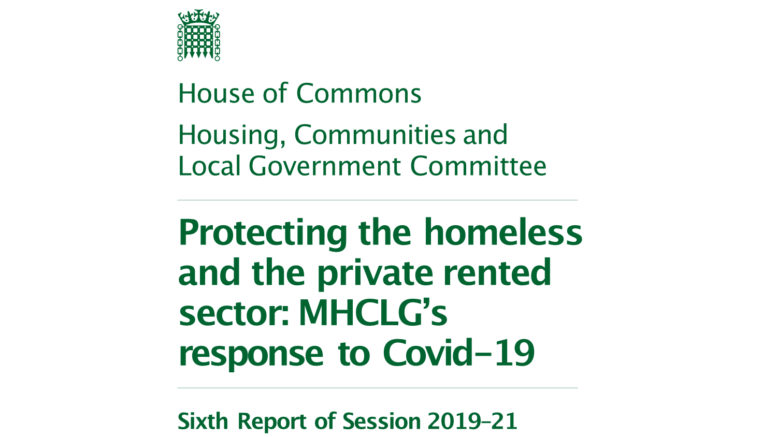Tenancy notice periods will return to pre-COVID lengths from 1 October 2021 ‘unless the public health situation warrants a further extension’.
So said the Government in responding to a highly critical Select Committee report on its record on homelessness and the private rented sector during the coronavirus crisis.
Its response was to defend its tenant support record, give a timetable for the easing of possession claims, and to reject a call for urgent introduction of a Renters Reform Bill.
The Housing, Communities and Local Government Select Committee’s sixth report concluded that the Government was in danger of breaking its pledge that no one would lose their home as a result of the pandemic. ‘We have seen no satisfactory evidence for why the Government changed the definition of substantial rent arrears to permit tenants who have built up arrears only during the pandemic to be evicted’, it said.
It also called on the Government to publish ‘a proper exit plan’ for the easing of private rented sector restrictions, and to introduce the Renters’ Reform Bill ‘urgently’.
It its response, published this week, the Government said it had introduced an unprecedented set of measures to prevent people from losing their homes as a result of the COVID-19 pandemic. ‘The data shows that our package of support has, and is, preventing evictions. The Ministry of Justice reported that applications to the courts for possession by private and social landlords between January and March 2021 were down 74 per cent compared to the same quarter in 2020. And only 812 repossessions were recorded between April 2020 and end March 2021 compared to 29,347 over the same period in 2019-2020’.
Its change in the definition of ‘substantial rent arrears’ to one of rent arrears of more than six months had been necessary for the continued stability of the private rented sector. ‘Many landlords have mortgages on their properties and although mortgage holidays have been available, in the longer-term their situation could become untenable, disrupting the market. It is not helpful to either the tenant or the landlord for the tenant to remain in a property that they cannot afford, accruing more arrears’.
Current regulations that ban bailiff evictions expire on 31 May 2021. ‘Given the requirement in most cases to provide 14 days’ notice of the enforcement of an eviction, evictions are not expected to resume until mid-June, except in the most egregious cases’, said the Government. The regulations were necessary at the height of the pandemic but ‘could only ever be temporary’.
Preventing landlords from enforcing evictions is not the best way to support renters or the rental market, said the response. ‘It is right for landlords to be able to access justice, particularly in cases where warrants pre-date the pandemic and landlords have been waiting many months to enforce a possession order’.
A call from the Select Committee for a financial package to support tenants to repay their COVID rent arrears met with a brick-wall recital of ‘unprecedented’ measures that had already been taken. However, ‘the Government will continue to monitor the effectiveness of our extensive financial support in protecting tenants and landlords, including through the English Housing Survey Household Resilience Study’, it promised.
There was a renewed commitment to deliver a Better Deal for Renters, including abolishing Section 21 ‘no fault’ evictions ‘to improve security for tenants, as well as strengthening repossession grounds for landlords when they have valid grounds’.
The proposals will introduce the biggest change to renting in 30 years and ‘it is only right that the Government takes the time to deliver a balanced set of reforms, and to allow time to consider the impact of the pandemic on the sector’.
It said it would be working In the coming months with ‘key sector voices’ to gather views. ‘We have already consulted on Section 21 reform, in the A New Deal for Renting: Resetting the Balance of Rights and Responsibilities Between Landlords and Tenants consultation. This received almost 20,000 responses and sought views on the best way to provide tenants with greater security, but also ensure that landlords are able to recover their properties where they have valid reasons to do so’.
It promised to bring forward a White Paper in the Autumn, focussed on abolishing Section 21 ‘while reforming possession grounds so that landlords can regain possession where it is fair and reasonable to do so, alongside further proposals to support tenants and landlords’.
The Government said it expected the White Paper to cover:
- Reforming tenancy law to remove Section 21 of the Housing Act 1988 and to amend the possession grounds under Section 8 of the Act, so that landlords can regain their property where it is fair and reasonable to do so, for example where they need to sell or move into a property;
- Introducing a new ‘lifetime’ deposit model to ease one of the key burdens when tenants need to move, while balancing landlords’ needs of a deposit scheme;
- Requiring all private landlords to belong to a redress scheme, to drive up standards in the private rented sector and ensure that all tenants have a right to redress;
- Considering further reforms of the private renter sector enforcement system so it is well targeted, effective and supports improvements in property conditions. This will include a set of measures to hold bad landlords to account for delivering safe and decent housing to tenants without penalising good landlords; and
- Exploring improvements and possible efficiencies to the possession process in the courts, to make it quicker and easier for landlords and tenants to use.
What the Government said about its timetable for easing restriction on landlord possession claims.
- The threshold for what constitutes ‘serious rent arrears’ will be reduced from six months’ arrears to four months’ arrears from 1 June and the notice period for serious rent arrears will remain at four weeks until 1 October.
- From 1 August, notice periods for arrears of less than four months’ rent will further reduce to two months.
- The intention is that notice periods will return to their pre-COVID lengths from 1 October 2021 unless the public health situation warrants a further extension, which we will keep under review.
- The Coronavirus Job Retention Scheme will continue to provide financial support until 30 September 2021.








